Affiliate links on Android Authority may earn us a commission. Learn more.
Samsung Galaxy Buds vs Apple AirPods (2019)
May 13, 2020
Aside from the Starks and the Lannisters, few rivalries are more intense than Apple and Samsung. Our sister site SoundGuys took the companies’ latest true wireless earbuds — the AirPods (2019) and Galaxy Buds — for a spin to determine which is best for most users.
Editor’s note: this article was updated on May 15, 2020, to address direct Spotify access with the latest Samsung Galaxy Buds software and to make note of the Google Pixel Buds (2020) as a viable alternative to the Apple AirPods and Samsung Galaxy Buds.
Hardware
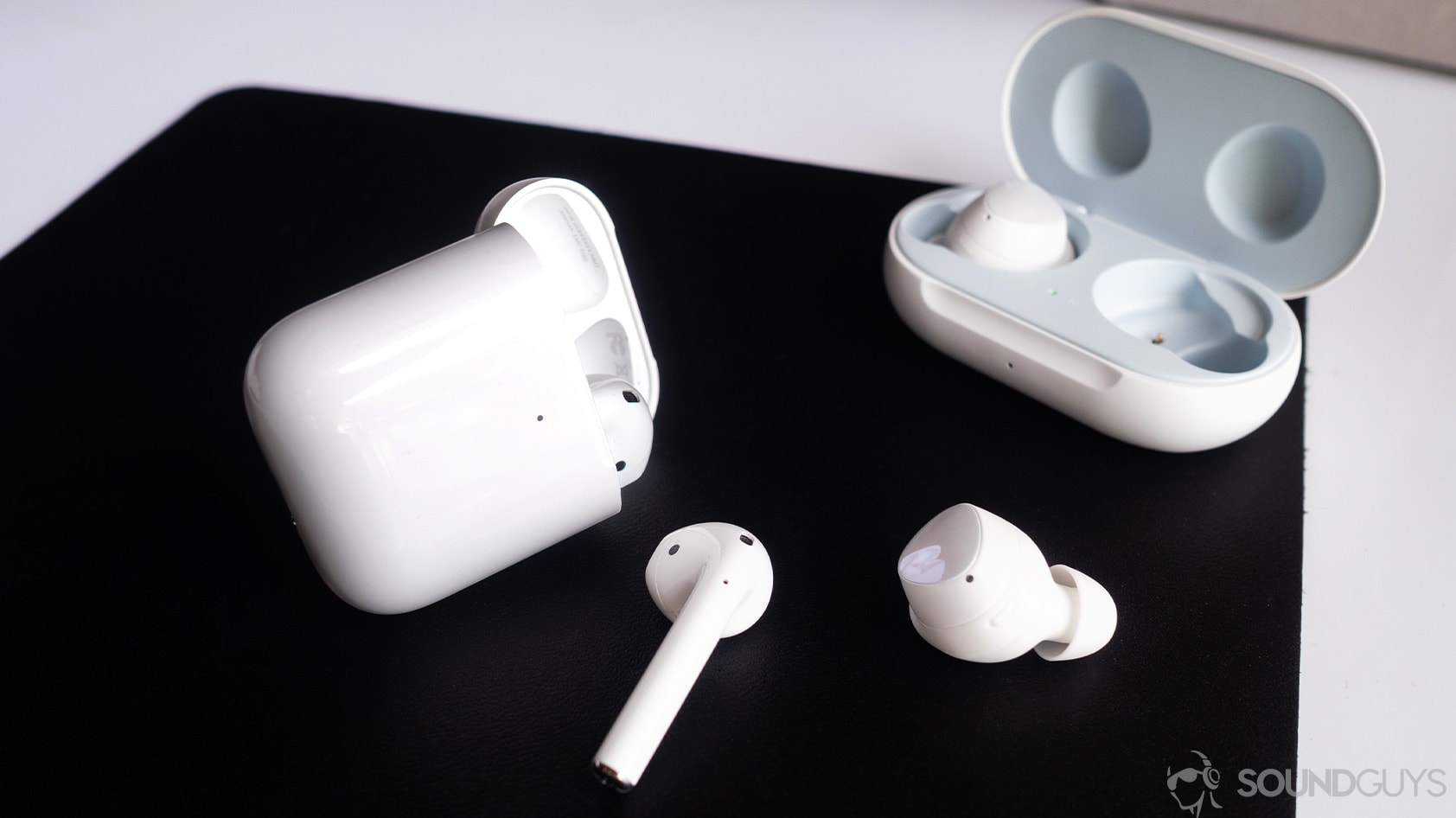
We’re working from the outside in to compare the Apple AirPods 2019 vs the Samsung Galaxy Buds: hardware first. These products sport starkly different designs from one another. The Samsung Galaxy Buds have a more whimsical appearance, while the AirPods rock the same minimalist design as their predecessor.
Both sets of earpieces house touch controls which may be remapped and customized. Apple’s AirPods use automatic ear detection, which can be toggled off. The Galaxy Buds include this feature and require users to tap either earbud to resume playback. Additionally, the AirPods grant you the liberty to choose whether sound is recorded through the left or right microphone.
Samsung's wireless charging is included, while AirPods users need to pay an extra $40 for the wireless charging case bundle.
Although both charging cases support wireless charging, Apple pulls a typical Apple move and requires an additional $40 for those who want the AirPods with the compatible wireless charging case. Samsung’s wireless charging, on the other hand, is included. Plus, the case can be charged atop any of the Samsung Galaxy S10 phones, thanks to the the phones’ reverse wireless charging functionality.
We tip our hats to Samsung on this one as the Buds offer better value and don’t hike the price for wireless charging.
Winner: Galaxy Buds
Microphone quality
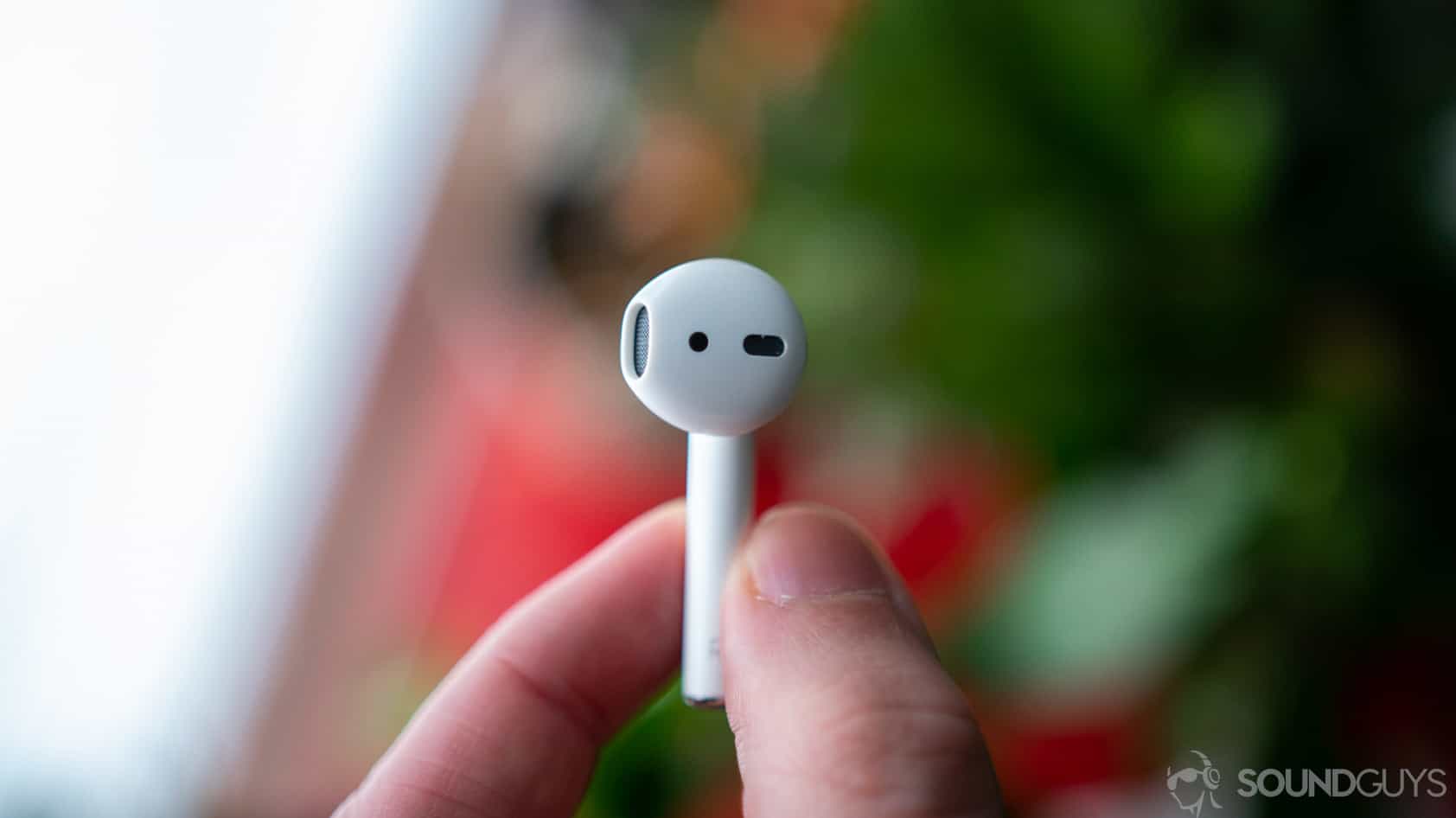
Relating to hardware is microphone quality. Again, the AirPods (2019) use a mic in each earbud, while the Samsung Galaxy Buds use an adaptive dual-mic array which alternates between the inner and outer mics to greatly reduce background noise.
Samsung Galaxy Buds microphone:
Apple AirPods (2019) microphone:
The clips above demonstrate the difference between the headset microphones. The fundamental frequency of my voice fluctuates from 160 to 240kHz, which is relayed best with the AirPods. Generally speaking, the AirPods sound much more accurate than the Galaxy Buds, which tend to transmit an echo along with vocals.
Winner: AirPods (2019)
Bluetooth support and connectivity
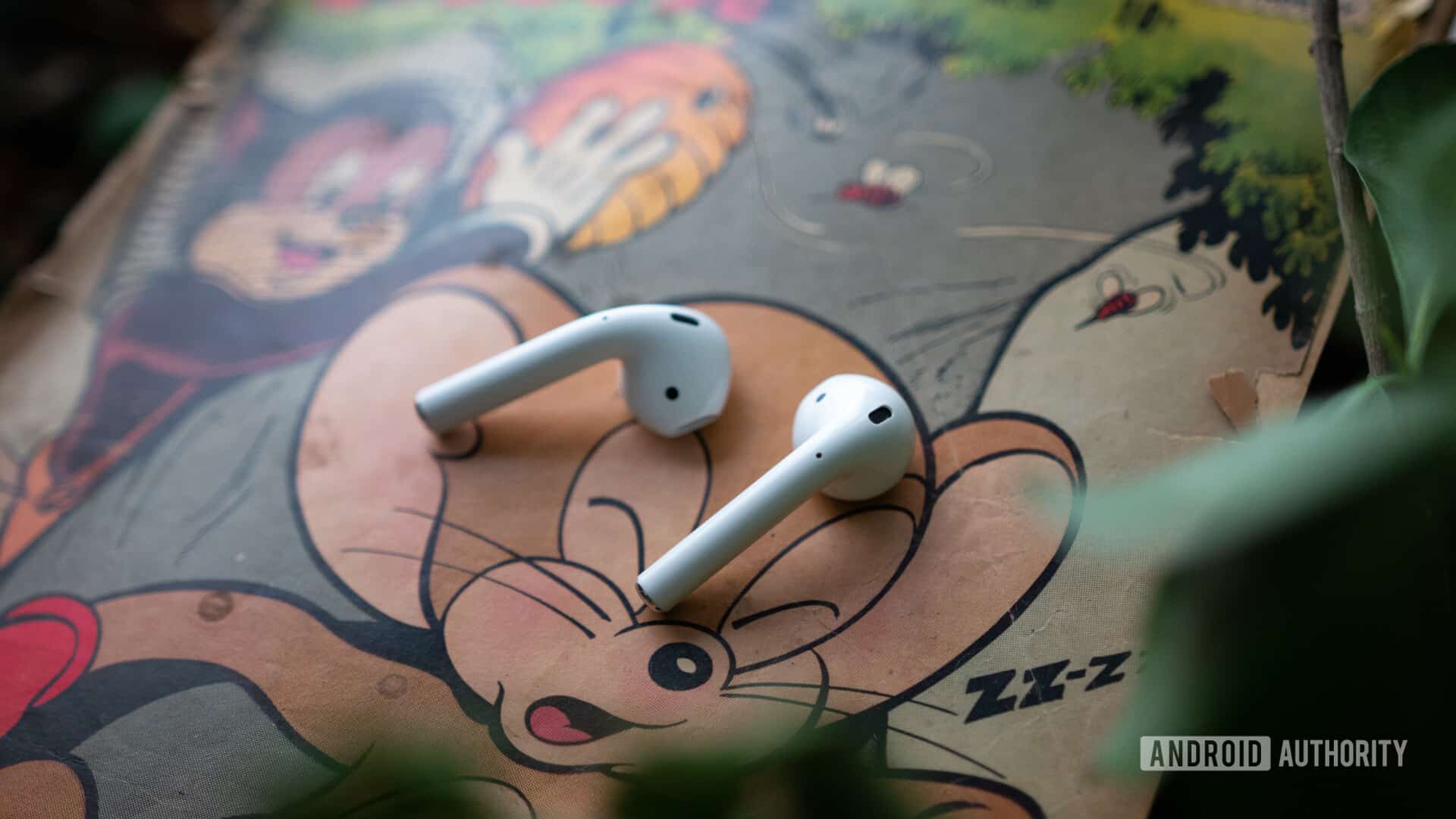
Samsung and Apple both opted for Bluetooth 5 with AAC codec support. What’s more, both integrate their respective voice assistants — Bixby for Samsung and Siri for Apple. That said, the Galaxy Buds only recently received this feature with the latest firmware version R170XXU0ASD4, whereas the Apple included support from the get go.
The AirPods use Apple’s H1 chip, the successor to its W1 chip, which minimizes latency and increases talk time by approximately 50 percent compared to the W1 chip. If you’re using the AirPods (2019) with an iOS device, connectivity remains stable and reliable. As you might expect, the same can’t quite be said when using an Android device.
Now, Samsung’s lack of aptX support is a misstep, but the Galaxy Buds do use the company’s proprietary scalable codec that’s constantly optimizing bitrate without compromising connectivity. In our initial testing, connectivity was reliable, but it soon became apparent that the Galaxy Buds are still plagued by connectivity hiccups. Hopefully, Samsung solves this with a firmware update, but for now, this point goes to the Cupertino kids. As of April 27, 2020, the Samsung Galaxy Buds have been granted direct Spotify access, which may be enabled after updating the headset software in the Galaxy Wearable app.
Winner: AirPods (2019)
Battery life
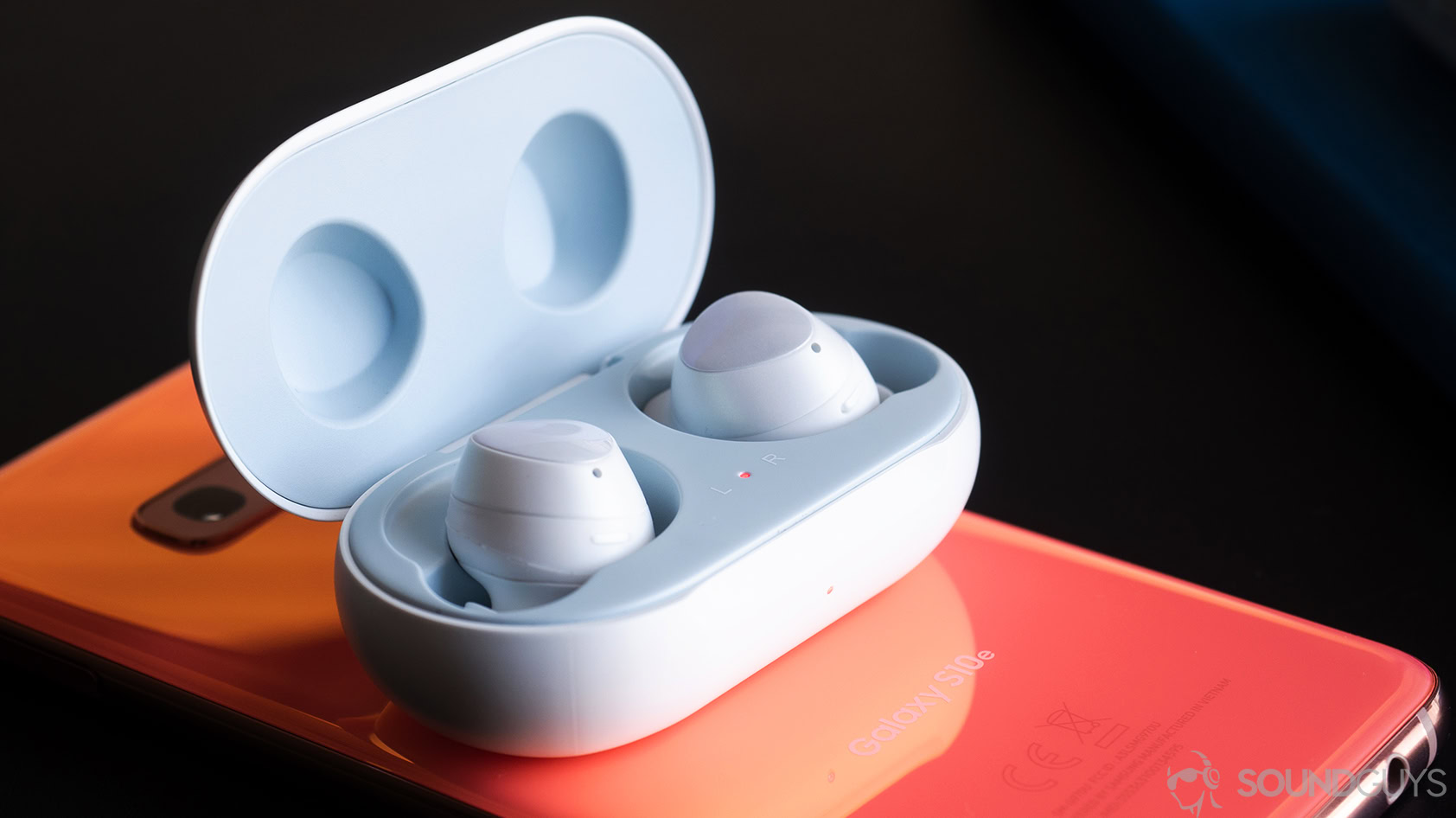
This one’s pretty easy to measure. The AirPods (2019) afforded 4.125 hours of playback. Sure, it falls short of Apple’s posited five-hour playback time, but it’s still a 21 percent increase from the first-generation AirPods. Given how the size and weight remains the same between the two models, it’s worth celebrating the H1 chip’s advancements. The Samsung Galaxy Buds clean house with 6.53 hours of playback on a single charge. The trade-off is the Galaxy Buds case only provides an additional seven hours of battery life, while the AirPods case provides an extra 20 hours.
Additionally, the Galaxy Buds’ quick charging capabilities fall short of the AirPods’. On the Samsung earbuds, 15 minutes in the case yields 1.7 hours of playback. Conversely, 15 minutes of charging the AirPods results in approximately three hours of playback. Each of us prioritizes battery life differently, but regarding standalone playback, Samsung takes the cake and devours it too.
Winner: Galaxy Buds
Fit and sound quality
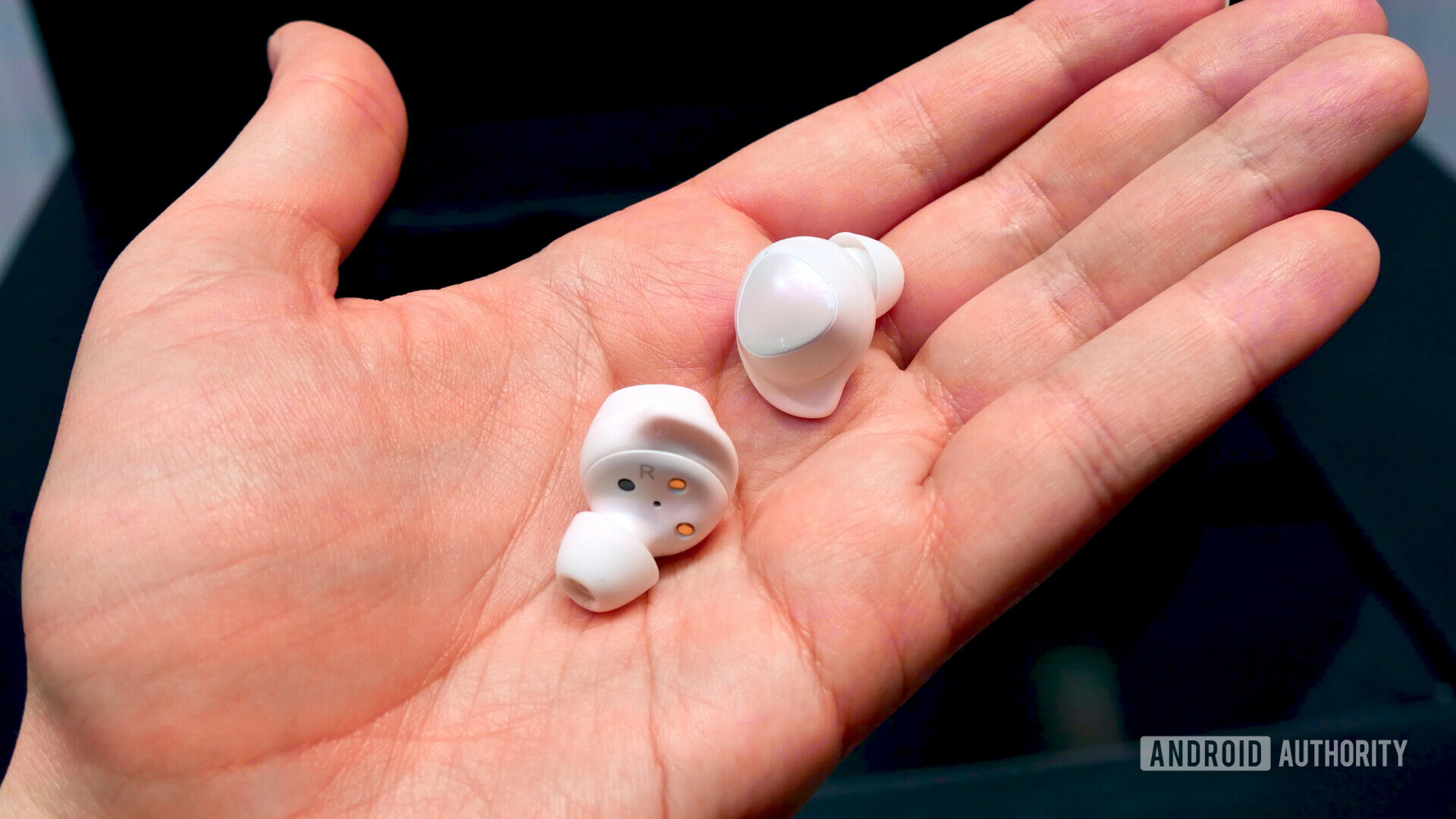
With all the features these earbuds have, it’s easy to overlook audio quality. Since you’re paying a premium no matter which pair you go with, it’s important that they sound good and fit comfortably.
Beginning with the latter, the AirPods are notorious for their dubious fit. While some are able to work out in them with ease, others — like me — are unable to keep them in place when walking. The lack of seal and distinguishable nozzles makes these prone to randomly dropping out of your ears. This is where the Samsung Galaxy Buds are much preferred as they have angled nozzles and include an assortment of ear and wing tips for a comfortable and secure fit.
Samsung also outperforms Apple when it comes to sound quality. Above are the frequency responses of both pairs of earbuds. These graphs depict how much emphasis is placed in a specific frequency range. The AirPods have a much more exaggerated bass response, which is a more consumer-friendly sound and necessary seeing as the AirPods don’t create a seal with the ear. This drastically degrades audio quality and promotes auditory masking.
The AirPods still don't create a true seal to the ear, making the Samsung Galaxy Buds more comfortable to wear.
The Samsung Galaxy Buds, though, have a neutral-leaning sound signature that bodes well for nearly all genres. Clarity and overall sound quality are better with the Galaxy Buds by nature of them being true in-ears that seal to your ear. Due to their solid fit, Samsung didn’t have to alter the frequency response too much for the Buds to sound good.
Winner: Galaxy Buds
The Samsung Galaxy Buds outperform the Apple AirPods (2019)
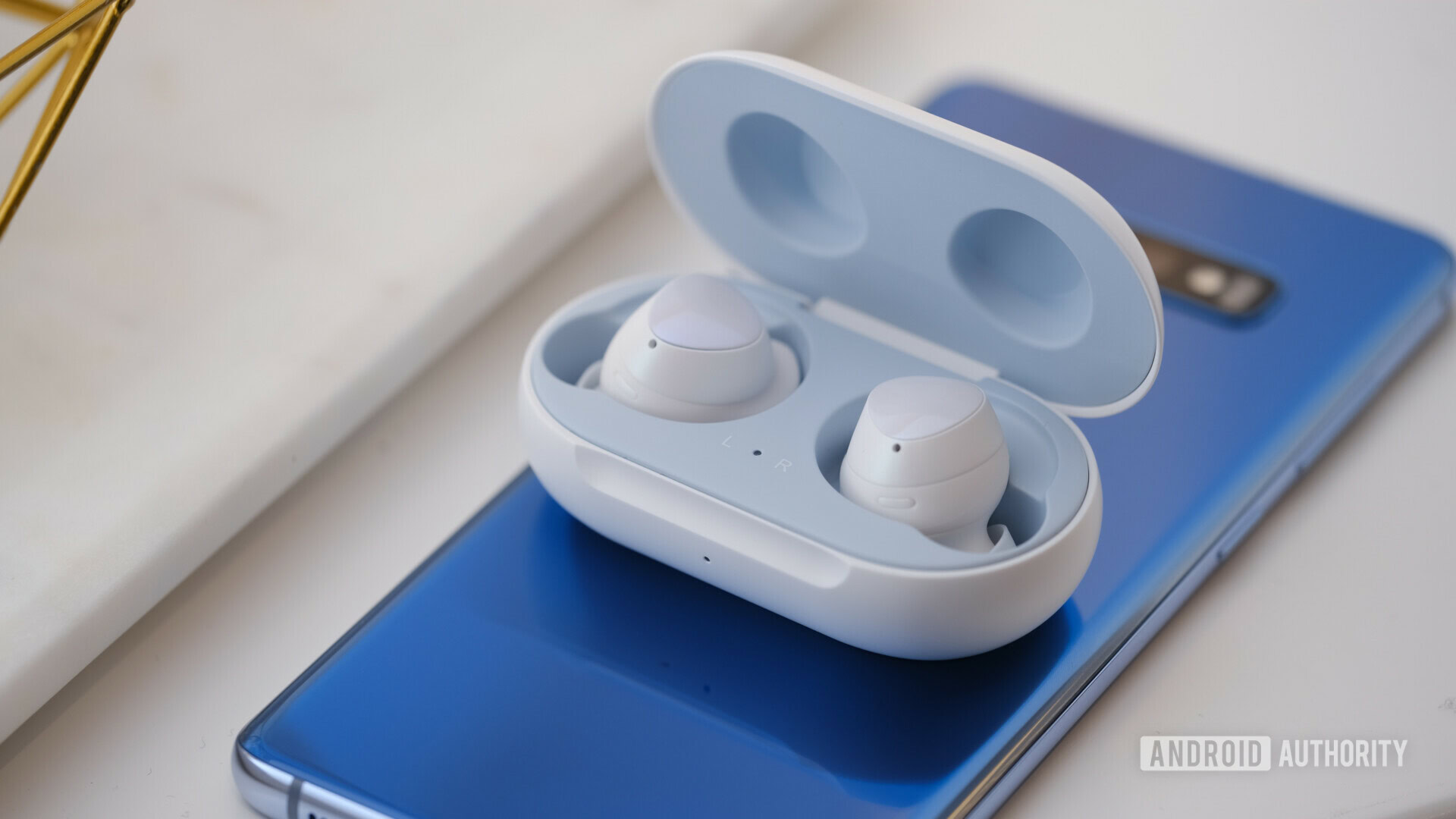
Looks like Samsung won this battle, but who knows about the war? At the end of the day, Apple users will probably gravitate toward the AirPods, while Android users will probably be more inclined to pick up a pair of Galaxy Buds. Sure, we can talk your ears off about the data recorded, but we don’t want to overlook the importance of personal preference.
If you like that the AirPods don’t create a cogent seal, then that may be a reason to buy, rather than avoid, them. However, if you want the best audio quality, comfort, and battery life, get the Galaxy Buds.
Need better battery life? Go with the Samsung Galaxy Buds Plus
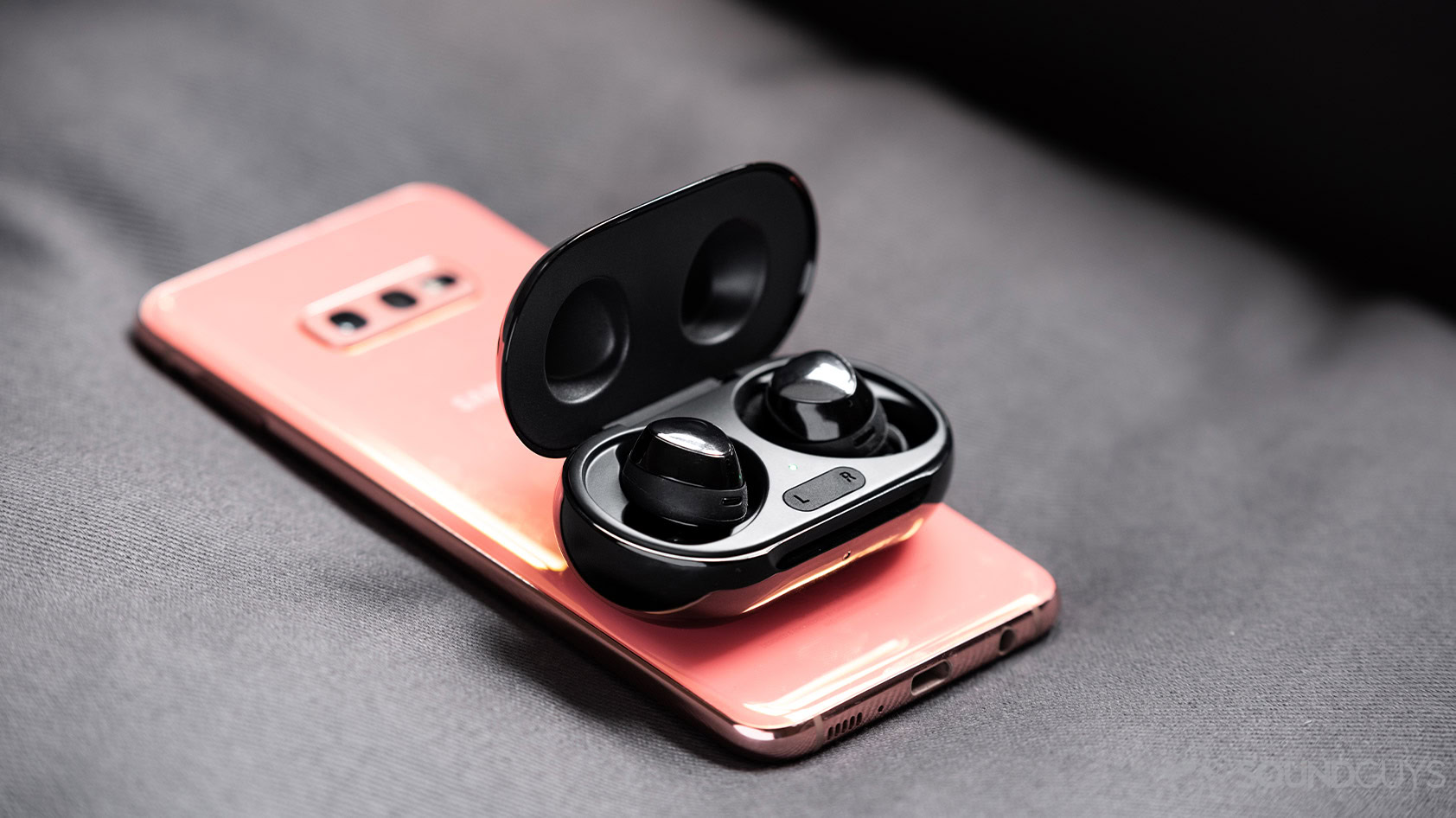
Samsung’s second-generation Galaxy Buds introduce Spotify integration, whereby users can remap the touch controls to directly access the popular streaming service for a random recommended tune. Unfortunately, this feature isn’t available to iPhone users. However, other improvements are universally beneficial like improved battery life: the Galaxy Buds Plus last 11 hours, 44 minutes on a single charge. Quick charging has also been improved as just three minutes in the case provides an hour of listening. Users with more than one Bluetooth 5.0 source device can also take advantage of the Samsung Galaxy Buds’ multipoint support, meaning you can connect to two devices simultaneously.
For direct Google Assistant access, get the new Google Pixel Buds (2020)
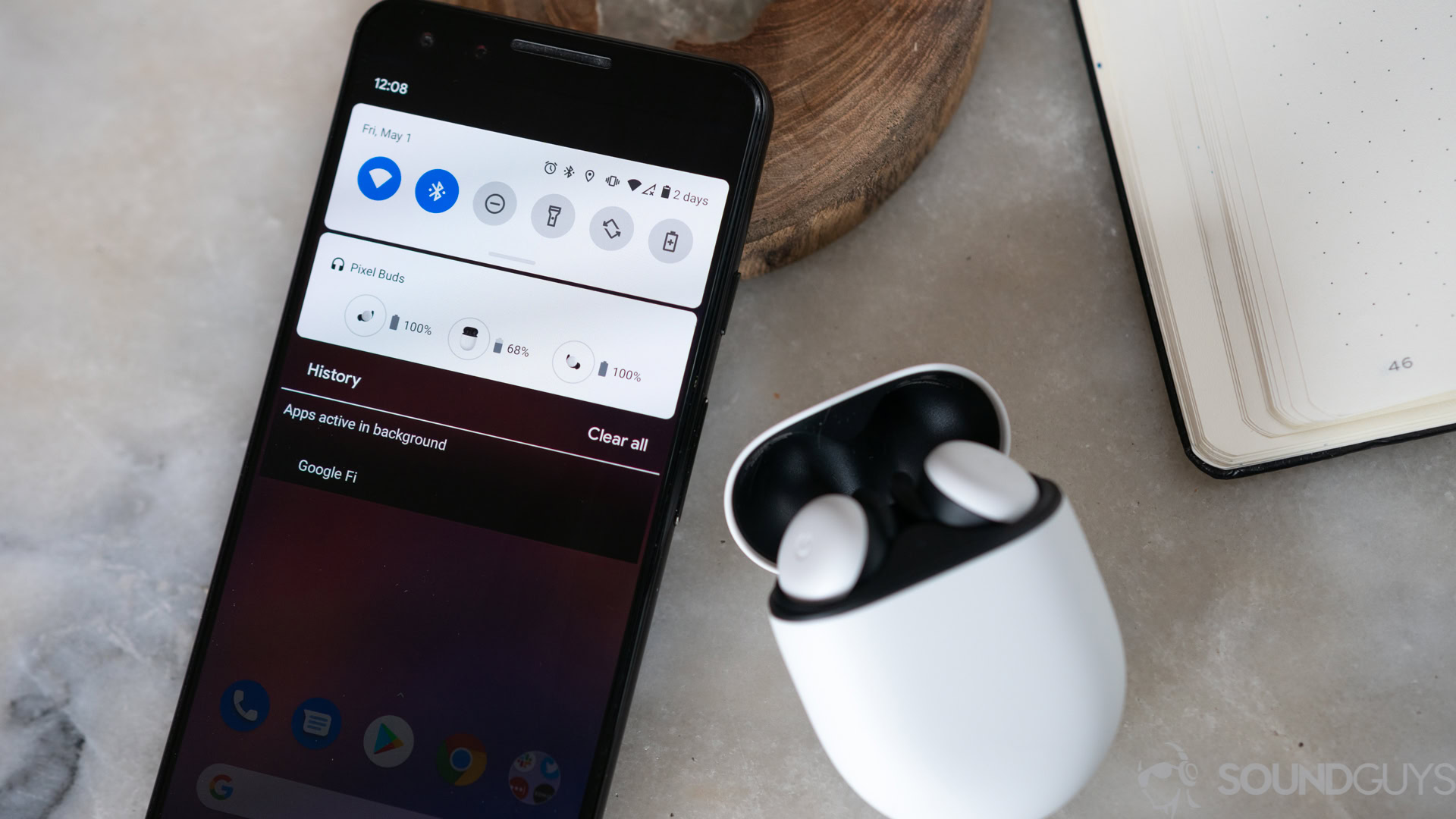
The new Google Pixel Buds (2020) is a great package from the earbuds to the wireless charging case. Its design is brilliant in its simplicity, and the pairing process is seamless on Android devices: a pop-up notification appears on nearby Android devices requesting pairing access when the case is opened for the first time. The disc-shaped earbud housings sit flush with the ear, and register touch gestures accurately. Listeners who don’t want to use their voices to wake Google Assistant may just tap and hold either touch panel to speak to the Assistant. Sound quality is much better than the AirPods (2019), and battery life is above average at . Anyone looking for an Apple-esque user experience but who happen to be Apple-averse, should consider the $179 Pixel Buds.
Consider saving for the Apple AirPods Pro
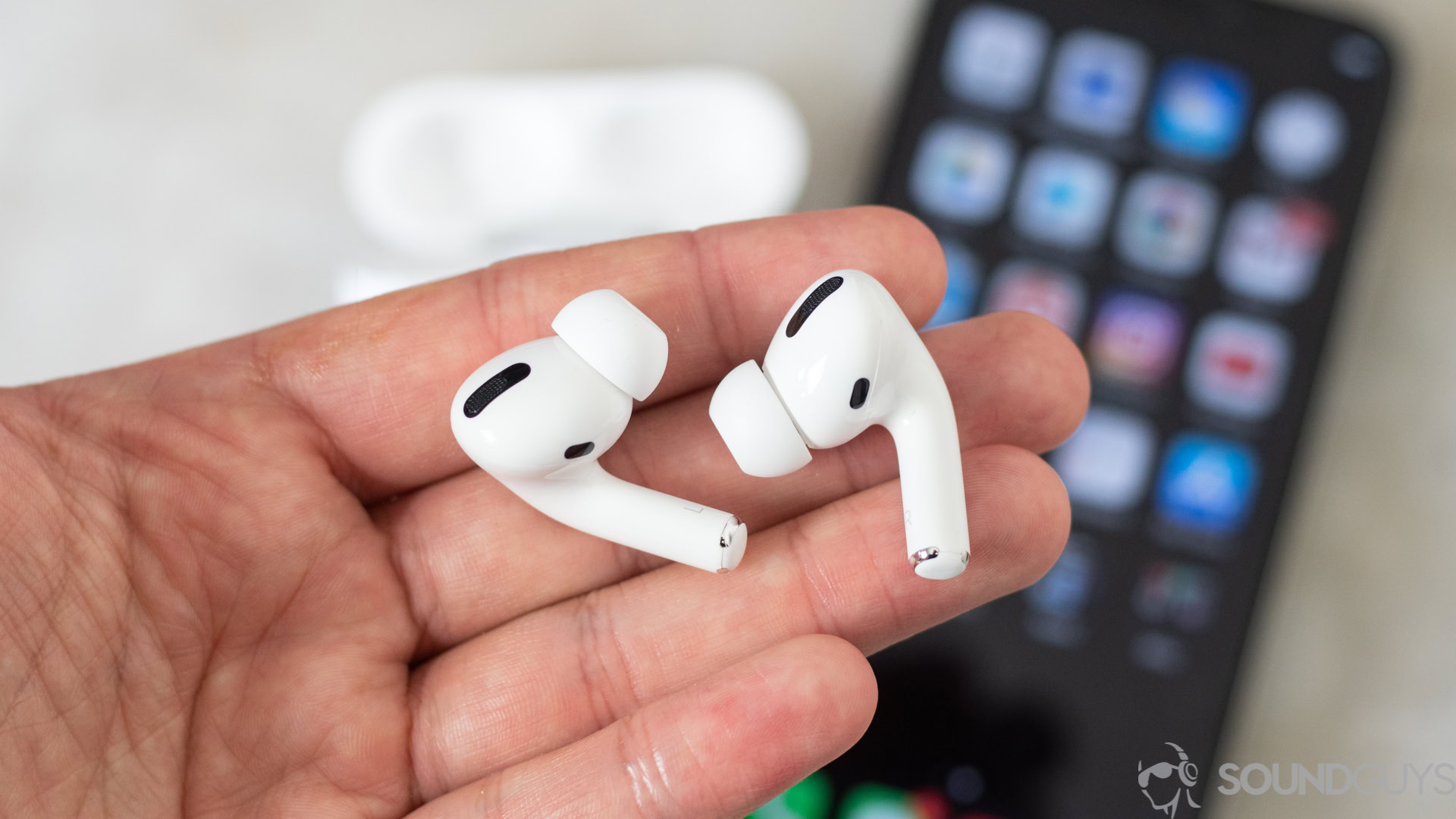
Apple released its AirPods Pro which outperforms the second-generation wireless earbuds in every way. These earbuds have nozzles that seal to the ear canal for vastly improved isolation and comfort. Plus, this design allows for noise canceling technology, which pits the AirPods Pro directly against the Sony WF-1000XM3. If you’re in the market for true wireless earbuds that can do a bit of everything with solid battery life to boot, you may want to save your pennies for Apple’s third iteration of total wireless earbuds.
Next: Best Beats alternatives